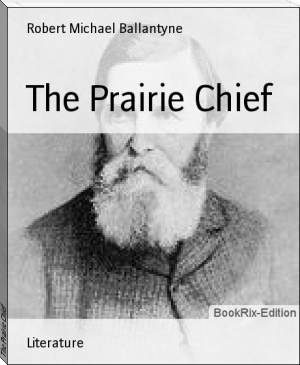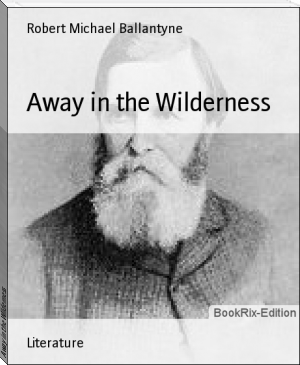The Prairie Chief - Robert Michael Ballantyne (the unexpected everything .TXT) 📗

- Author: Robert Michael Ballantyne
Book online «The Prairie Chief - Robert Michael Ballantyne (the unexpected everything .TXT) 📗». Author Robert Michael Ballantyne
Long before they reached Eaglenose's mother's wigwam, Moonlight was surprised to hear the well known voice of Skipping Rabbit shouting in unrestrained peals of merry laughter. On entering, the cause thereof was at once apparent, for there sat Eaglenose beside his mother (whose nose, by the way, was similar to his own) amusing the child with a home-made jumping-jack. Having seen a toy of this kind during one of his visits to the settlements of the pale-faces, the Blackfoot youth had made mental notes of it, and on his return home had constructed a jumping-jack, which rendered him more popular in his tribe--especially with the youngsters--than if he had been a powerful medicine-man or a noted warrior.
When Moonlight entered, Skipping Rabbit was standing in front of Eaglenose with clasped hands and glittering eyes, shrieking with delight as the absurd creature of wood threw up its legs and arms, kicked its own head, and all but dislocated its own limbs. Catching sight of her friend, however, she gave vent to another shriek with deeper delight in it, and, bounding towards her, sprang into her arms.
Regarding this open display of affection with some surprise, and rightly ascribing it to the influence of white blood in Bounding Bull's camp, Umqua asked Eaglenose's mother if the men were getting ready to go on the war-path.
"I know not. Perhaps my son knows."
Thus directly referred to, Eaglenose, who was but a young warrior just emancipated from boyhood, and who had yet to win his spurs, rose, and, becoming so grave and owlish that his naturally prominent feature seemed to increase in size, said sententiously--
"It is not for squaws to inquire into the plans of _men_, but as there is no secret in what we are going to do, I may tell you, mother, that women and children have not yet learned to live on grass or air. We go just now to procure fresh meat."
So saying, the stripling pitched the jumping-jack into the lap of Skipping Rabbit, and strode out of the lodge with the pomposity of seven chiefs!
That night, when the captives were lying side by side in Umqua's wigwam, gazing at the stars through the hole which was left in the top for the egress of the smoke, Moonlight said to her little friend--
"Does the skipping one know that it is Rushing River who has caught us and carried us away?"
The skipping one said that she had not known, but, now that she did know, she hated him with all her heart.
"So do I," said Moonlight firmly. But Moonlight was wrong, for she hated the man with only a very small portion of her heart, and loved him with all the rest. It was probably some faint recognition of this fact that induced her to add with the intense energy of one who is resolved to walk in the path of duty--"I hate _all_ the Blackfeet!"
"So do I," returned the child, and then pausing, slowly added, "except"--and paused again.
"Well, who does the skipping one except?"
"Eaglenose," replied the skipper promptly. "I can't hate _him_, he is such a very funny brave."
After a prolonged silence Moonlight whispered--
"Does Skipping Rabbit sleep?"
"No."
"Is there not something in the great medicine-book that father speaks so much about which teaches that we should love our enemies?"
"I don't know," replied the little one. "Bounding Bull never taught that to _me_."
Again there was silence, during which Moonlight hoped in a confused sort of way that the teaching might be true. Before she could come to a conclusion on the perplexing point both she and her little friend were in that mysterious region where the human body usually ceases to be troubled by the human mind.
When Bounding Bull and Little Tim found that the Blackfoot chief had escaped them, they experienced what is often termed among Christians a great trial of faith. They did not indeed express their thoughts in language, but they could not quite prevent their looks from betraying their feelings, while in their thoughts they felt sorely tempted to charge God with indifference to their feelings, and even with something like cruelty, in thus permitting the guilty to triumph and the innocent to suffer. The state of mind is not, indeed, unfamiliar to people who are supposed to enjoy higher culture than the inhabitants of the wilderness. Even Whitewing's spirit was depressed for a time, and he could offer no consolation to the bereaved fathers, or find much comfort to himself; yet in the midst of all the mental darkness by which he was at that time surrounded, two sentences which the pale-face missionary had impressed on him gleamed forth now and then, like two flickering stars in a very black sky. The one was, "Shall not the Judge of all the earth do right?" the other, "He doeth all things well." But he did not at that time try to point out the light to his companions.
Burning with rage, mingled somewhat with despair, the white hunter and the red chief returned home in hot haste, bent on collecting a force of men so strong that they would be enabled to go forth with the absolute certainty of rescuing their children, or of avenging them by sweeping the entire Blackfoot nation, root and branch, off the face of the earth; and adorning the garments of their braves with their scalp-locks for ages to come.
It may be easily believed that they did not waste time on the way. Desperate men cannot rest. To halt for a brief space in order to take food and sleep just sufficient to sustain them was all the relaxation they allowed themselves. This was, of course, simply a process of wearing out their strength, but they were very strong men, long inured to hardships, and did not easily wear out.
One night they sat round the camp fire, very weary, and in silence. The fire was low and exceedingly small. Indeed, they did not dare to venture on a large one while near the enemy's country, and usually contented themselves with a supper of cold, uncooked pemmican. On this night, however, they were more fatigued than usual--perhaps depression of spirit had much to do with it--so they had kindled a fire and warmed their supper.
"What are the thoughts of Bounding Bull?" said Little Tim, at length breaking silence with something like a groan.
"Despair," replied the chief, with a dark frown; "and," he added, with a touch of hesitation, "revenge."
"Your thoughts are not much different from mine," returned the hunter.
"My brothers are not wise," said Whitewing, after another silence. "All that Manitou does to His children is good. I have hope."
"I wish my brother could give me some of his hope. What does he rest his hope on?" asked Little Tim.
"Long ago," answered the chief, "when Rushing River was a boy, the white preacher spoke to him about his soul and the Saviour. The boy's heart was touched. I saw it; I knew it. The seed has lain long in the ground, but it is sure to grow, for it must have been the Spirit of Manitou that touched him; and will He not finish the work that He begins? That is my hope."
The chief's eyes glittered in the firelight while he spoke. His two companions listened with grave attention, but said no word in reply. Yet it was evident, as they lay down for a few hours' rest, that the scowl of revenge and the writing of despair had alike in some measure departed from the brow of each.
CHAPTER THIRTEEN.
THE POWERFUL INFLUENCE OF BAD WEAPONS AND OF LOVE.
While the bereaved parents were thus hastening by forced marches to their own camp, a band of Blackfeet was riding in another direction in quest of buffalo, for their last supply of fresh meat had been nearly consumed. Along with them they took several women to dry the meat and otherwise prepare it. Among these were poor Moonlight and her friend Skipping Rabbit, also their guardian Umqua.
Ever since their arrival in camp Rushing River had not only refrained from speaking to his captives, but had carefully avoided them. Moonlight was pleased at first but at last she began to wonder why he was so shy, and, having utterly failed in her efforts to hate him, she naturally began to feel a little hurt by his apparent indifference.
Very different was the conduct of Eaglenose, who also accompanied the hunting expedition. That vivacious youth, breaking through all the customs and peculiarities of Red Indian etiquette, frequently during the journey came and talked with Moonlight, and seemed to take special pleasure in amusing Skipping Rabbit.
"Has the skipping one," he said on one occasion, "brought with her the little man that jumps?" by which expression he referred to the jumping-jack.
"Yes, he is with the pack-horses. Does Eaglenose want to play with him?"
Oh, she was a sly and precocious little rabbit, who had used well her opportunities of association with Little Tim to pick up the ways and manners of the pale-faces--to the surprise and occasional amusement of her red relations, whom she frequently scandalised not a little. Well did she know how sensitive a young Indian brave is as to his dignity, how he scorns to be thought childish, and how he fancies that he looks like a splendid man when he struts with superhuman gravity, just as a white boy does when he puts a cigar between his unfledged lips. She thought she had given a tremendous stab to the dignity of Eaglenose; and so she had, yet it happened that the dignity of Eaglenose escaped, because it was shielded by a buckler of fun so thick that it could not easily be pierced by shafts of ridicule.
"Yes; I want to play with him," answered the youth, with perfect gravity, but a twinkle of the eyes that did not escape Skipping Rabbit; "I'm fond of playing with him, because he is your little husband, and I want to make friends with the husband of the skipping one; he is so active, and kicks about his arms and legs so well. Does he ever kick his little squaw? I hope not."
"Oh yes, sometimes," returned the child. "He kicked me last night because I said he was so like Eaglenose."
"The little husband did well. A wooden chief so grand did not like to be compared to a poor young brave who has only begun to go on the war-path, and has taken no scalps yet."
The mention of war-path and scalps had the effect of quieting the poor child's tendency to repartee. She thought of her father and Little Tim, and became suddenly grave.
Perceiving and regretting this, the young Indian hastily changed the subject of conversation.
"The Blackfeet," he said, "have heard much about the great pale-faced chief called Leetil Tim. Does the skipping one know Leetil Tim?"
The skipping one, whose good humour was quite restored





Comments (0)